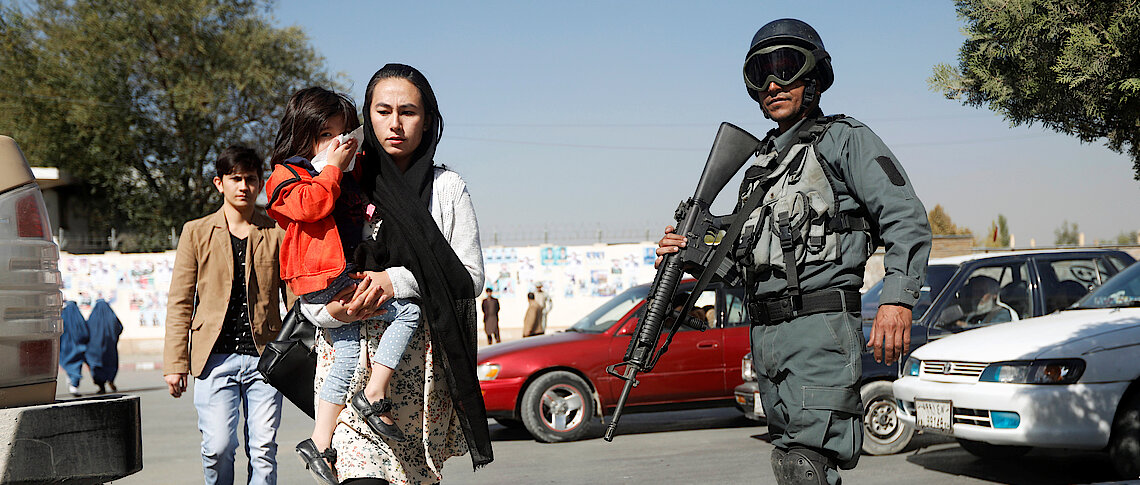Read this interview in German or Russian.
On 28 September, Afghanistan will finally have its presidential elections, after they have already been postponed two times this year. However, the difficult security situation in the country might lead to many people not being able to participate. Do you think that it was nonetheless the right decision to go forward with the elections?
It was definitely the right decision to go for the election. I think we have been going through a democratic process, so there should be elections. If we stop it now and have another interim government, we don’t know what will be happening next. Even if you delay it, you don’t have any guarantees that security will get better. And it makes it more difficult in some of the provinces, there will be snow soon and that would also affect the way people will be able to participate. So this time, security will certainly not be good but I hope that people participate in the elections and vote.
It sounds like you’re worried that there would be a legitimacy crisis of the democratic process if the elections would be further postponed. Is that right?
Definitely. One of the biggest problems we had was that some politicians were after the government. They will use these small things and amplify them and say, the president is doing this because it’s not a legitimate government anymore.
So for the sake of legitimacy, to run the government, we need the elections. I think the Afghan government and the Afghan people will be in a better position to negotiate then.
There are reports of rampant corruption in the electoral system, which would also put the legitimacy of the next government at risk. Do you think the elections will be free or fair?
We are in a different part of the world. If you expect that everything will be clean in Afghanistan, look at other countries and our neighbours. Despite their relative peace, and despite them practising elections for a long time, there are also allegations of corruptions in, for instance, Pakistan. You can’t expect very clean and transparent elections in Afghanistan. There will be corruption. But the problem is that the people who lose, they will only blame the others who won.
From abroad, it looks like the Afghan government is relatively weak. The Taliban have gained a bigger territory ever since 2014. How do you assess the government’s track record, especially in the past five years?
There are a number of ways to look at that. If you also think these places who are under Taliban control are supporting the Taliban, that’s not the case. If the Taliban are not allowing people to come and use government services, for instance, it’s not that we say we actually control this area. They’re pushing people, terrorising people not to go to the government’s side. They are taxing people by force, or not allowing people to go to the government offices and that could be done by a small group in the districts to terrorise people.
In that scenario, one could say that the Taliban actually control 50 per cent or so of the population or of that area. But so when some say “under their control”, for me it wouldn’t mean that they are actually under their control. The government would not have a checkpoint or a police force in every village, so that figure is not reasonable.
Earlier this month, President Trump abruptly cancelled the peace talks with the Taliban in a tweet. Reportedly, most people in Afghanistan were actually relieved that this broke down. If that is true, why did they react that way, and what does the breakdown of the talks mean for the peace prospects in the country?
I think Trump’s tweet was good and bad news at the same time. Good news because many Afghans were relieved that we narrowly avoided a bad deal. Some were even worried there’d maybe be a civil war, if the Taliban take over the government completely. That’s the way some people were thinking, as the Americans were negotiating with the Taliban while the Afghan government wasn’t involved.
So that’s why people were hoping that, after the election, there will be a better deal with the Taliban. There will be power-sharing and Afghan national security forces will be in place. So in that sense, it was good news for many people.
But the bad news is, in case the Americans do not start negotiations with the Taliban again soon, Trump is going to need something for the US elections. If peace talks don’t start directly after the elections in Afghanistan, the fear is that in order to have something achieved, Trump will try to increase militia operations. This will, I think, end up in more civil casualties, more night raids, more Afghans killed and more bloodshed.
But many Afghans were asking that the Americans first reach an agreement on a ceasefire and then start negotiating. Especially if the negotiations takes longer: with the Americans, they already lasted for nine months. But if it’s going to happen with the Afghan government, it’s much more complicated and it might take longer. And during these negotiations, if there isn’t a ceasefire, both sides will try to gain more ground in Afghanistan. So that’s why many Afghans are thinking: if you’re going to start, have a ceasefire first.
What do you hope will happen after the election, in terms of the peace negotiations?
First, I hope that after the election it’s soon decided who won the elections and we have a proper government. I hope it doesn’t take as long as it took in 2014: six months of negotiations. And then, I think everybody, including the Americans, know that we need a peace process, we need a political settlement. You can’t win it militarily.
We hope this starts soon, but as I said earlier, a ceasefire is the first step. Because it’s the civilians who are going to lose because both sides will try to fight during the negotiations, months or days or years. So we hope, if they first reach a ceasefire, that would be good news for the general public.
What do Afghans think about the discussions of a possible withdrawal of NATO troops? In the democratic primary debates, both Elizabeth Warren and Bernie Sanders support the withdrawal of troops. Warren spoke of at least 19,000 US soldiers. And Trump also promised to withdraw but he didn’t do it. How do you see this?
It’s difficult. If you ask Afghans this question, some of them will say, okay, tell them to leave tomorrow. Even former president Karzai said “tell the Americans to leave tomorrow”. But I think it wouldn’t be wise to say that Americans and NATO should leave quickly.
We are not happy that the Americans are there and there’s more fighting, there’s more bombardment, people are killed in the village and night raids. If America’s involvement is a source of more fighting, everybody would say leave, but Afghans are afraid of what’s happening after they leave. Let’s say NATO forces left. The question is: will Kabul and the Taliban stop the fighting?
But if the Taliban would start to negotiate with the Afghan government and reach an agreement on a ceasefire, I think most Afghans would say we don’t need NATO forces. Peace is the priority. Even if the NATO forces are taking the development aid with them, peace is more important than entire development aid.
But I have another concern. If you don’t have the presence of international forces and the international community – and, let’s say, that you don’t have the Taliban and ISIS as a threat – you can’t guarantee that those who are running for the presidency now will not fight with each other. So there are still the politicians we’re worried about it. Everybody tried before to use weapons and resorted to violence to get to the presidential seat, so I think we need some international presence to keep things together.
How is the EU’s role seen in the country?
The way the EU has been involved at the negotiating table – listening to the Afghan side – it was the only avenue to complain about the Americans talking to the Taliban behind closed doors. The EU was the only structure that we could raise our voice to. And we thought that they are more honest and the only ones who have the leverage to talk to the Americans.
So the EU is very important to have more international pressure. Because if you listen to some of the statements that they gave, countries like Germany and the EU, they were quite in line with what civil society Afghans wants.
One last, admittedly very complex question: from the Afghan point of view, has the whole intervention since 2001 failed?
No, I wouldn’t say it has failed. From the beginning until now, of course we have made mistakes, both the international community and the Afghan government. And one of the biggest failures was that the Americans and the EU didn’t put enough pressure on our neighbours.
People know what’s happened in Pakistan. In order to fight the Taliban in Afghanistan, why are you not putting more political pressure to stop these things in our neighbouring countries. Afghanistan became the place where everybody wanted to have their own piece to serve their interests. The Taliban are going to China, Russia, Iran for the sake of trying to tell these neighbours and regional powers that they want peace and Americans don’t want peace.
There were of course problems with the way international forces behaved in Afghanistan, there were problems with the Afghanistan government, the corruption, their behaviour with ordinary people. That’s another set of problems. But then, our international friends just turned a blind eye to our neighbours. All of that led to the current situation.
This interview was conducted by Daniel Kopp.






